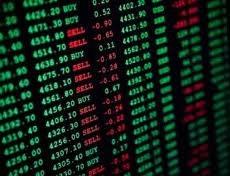European stocks slide on China rate action, euro firms
In  Paris, the CAC 40 slipped 0.98 per cent to 3,862.19 points, while in Frankfurt the DAX slipped 1.23 per cent and dropped back below the 7,000-barrier, ending at 6,970.73 points.
Paris, the CAC 40 slipped 0.98 per cent to 3,862.19 points, while in Frankfurt the DAX slipped 1.23 per cent and dropped back below the 7,000-barrier, ending at 6,970.73 points.
The London Stock Exchange was closed for a public holiday.
On the currency market the euro rose to $1.3148 in late afternoon trade from 1.3116 late on Friday.
The dollar was stable at 82.82 yen against 82.90 on Friday.
Elsewhere in Europe, Madrid's IBEX-35 stock index lost 2.06 per cent, Milan fell 1.25 per cent, Lisbon lost 1.16 per cent, Brussels dropped 1.09 per cent, Swiss stocks slid 0.47 per cent and Amsterdam dipped 0.10 per cent.
Investors were digesting a decision Saturday by China's central bank to raise interest rates for the second time in less than three months as part of a campaign to curb borrowing, rein in property prices and tame inflation.
The People's Bank of China said in a brief one-line statement that it will raise the one-year lending and deposit rates by 0.25 points each. The move takes the rates to 5.81 per cent and 2.75 per cent respectively from Sunday.
In mid-October, policymakers raised rates for the first time in nearly three years to try to slow a flood of liquidity that has been fanning inflation and driving up property prices.
The central bank action prompted concern for the pace of Chinese economic growth, which is seen as critical to the global economy.
But economist Francois Duhen of CM-CIC Securities commented: "This hike is not a surprise to us."
He said six previous increases in obligatory reserve levels for Chinese banks had not resulted in "the desired reduction in lending, nor in a drop in real estate speculation nor in a cooling of inflation."
In Paris bank shares came under pressure, with Societe Generale down 1.89 per cent and Credit Agricole 1.98 per cent.
On the Frankfurt market it was the automobile sector that led decliners, hit not only by the Chinese rate hike but by a decision by the Chinese capital to cut new car registrations by two-thirds to try to ease the Beijing's massive traffic jams.
Daimler dropped 4.62 per cent, Volkswagen 4.76 per cent and BMW 6.39 per cent.
German automakers in particular have looked to China's rapidly growing market for future expansion.
Beijing sales account for seven per cent of Chinese auto sales.
"The fear of the market is that this initiative of Beijing is copied by other Chinese mega-cities which are confronted by the same traffic problems," NordLB analyst Frank Schwope told AFP.
The Chinese rate move also hit stocks on Wall Street. The Dow Jones Industrial Average had slid by 0.28 per cent at midday to 11,541.10 points.
"The unexpected rate hike by the People's Bank of China over the holiday weekend may temper equities heading into the new year," said Moody's Analytics' Michael Bratus.
The broader S&P 500 index was down 0.18 per cent to 1,254.57 points and the tech-rich NASDAQ slid 0.49 per cent to 2,652.57 points.
But experts cautioned that thin trade did not hold much meaning.
"We wouldn't read a whole lot into any of today's moves because they will occur on light volume," said Patrick O'Hare of Briefing.com.
Currency traders appeared to take the Chinese rate hike in stride, analysts said, seeing it as part of gradual tightening in monetary policy that should not hamper Chinese economic momentum.
In London on Monday, the euro changed hands at $1.3148 against $1.3116 late in New York on Friday, at 108.89 yen (108.74), 0.8526 pounds (0.8494) and 1.2650 Swiss francs (1.2616).
The dollar stood at 82.82 yen (82.90) and 0.9621 Swiss francs (0.9618).
The pound was at $1.5420 (1.5441).
Many players in the currency market had expected Asian share prices to fall after China hiked rates.
But contrary to market expectations, Japan's benchmark Nikkei index on the Tokyo Stock Exchange closed up 0.75 per cent and China's Shanghai Composite Index rose 0.38 per cent.
These market moves prompted forex investors to buy back risk-sensitive euros sold earlier in the day, dealers said.
"The market is still risk-on," Tsutomu Soma, a senior dealer at Okasan Securities, told Dow Jones Newswires.
Dealers said financial markets had factored in the Chinese rate rise.
"Given China's high inflation rate, everybody knew it was coming," said Jun Kato, a senior dealer at Shinkin Asset Management.
What the stars mean:
★ Poor ★ ★ Promising ★★★ Good ★★★★ Very good ★★★★★ Exceptional
 Tag:
Tag:
Related Contents
Latest News
More News
- Citi sharpens its focus on institutional banking (February 09, 2026 | 19:58)
- SSC steps up engagement with FTSE Russell on market reforms (February 09, 2026 | 17:33)
- IFC considers $50m trade finance guarantee facility for Nam A Bank (February 09, 2026 | 17:28)
- Hoa Phat Agricultural Development debuts shares on HSX (February 06, 2026 | 14:00)
- Vietcap’s VAD 2026 draws strong global investor turnout (February 06, 2026 | 13:30)
- New rules ease foreign access to Vietnam equities (February 05, 2026 | 17:29)
- 0.1 per cent tax proposed on each transfer of digital assets (February 05, 2026 | 17:27)
- Ministry of Finance tightens policy delivery at start of year (February 05, 2026 | 17:26)
- Vietnam steps up market reforms as FTSE Russell reviews upgrade progress (February 05, 2026 | 17:20)
- 2025 profits mixed amid strong energy and farming results (February 05, 2026 | 17:18)






















 Mobile Version
Mobile Version